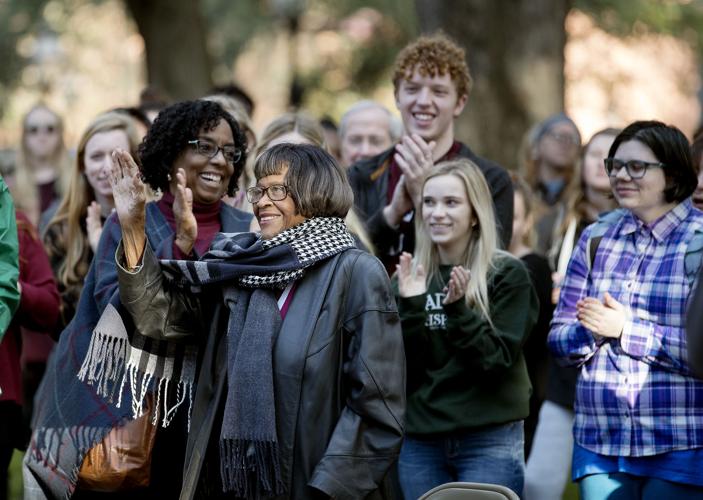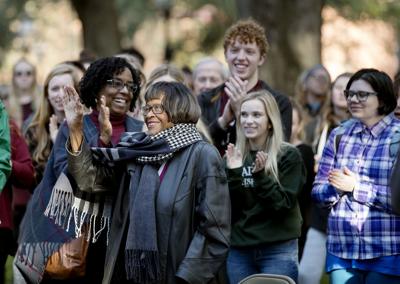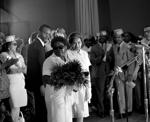Accomplishment was her reward — not her own success as much as the achievements of others. For Lucille Whipper was an educator first and forever, a mentor, a quiet leader whose example inspired a generation.
She was successful to be sure. She helped save the Avery Institute, as it was called in the 1980s; she spoke truth within the chambers of the state House of Representatives for a decade; she raised money to send to countries in Africa coping with the AIDS crisis and endemic poverty.
“She would hear about a problem, or just somebody who was in trouble, and her attitude was never, ‘Should we get involved and try to help?’ It was, ‘What can we do to help?’,” recalled Steve Skardon, director of the Palmetto Project, which managed Whipper’s Lowcountry Aid to Africa program. “Her family’s a lot like that. They’re just doers. ... I always found that attitude very refreshing, and I saw it in action. I loved that part about her.”
Whipper, who died on Aug. 27 at age 93, was among the Lowcountry’s most respected and beloved civic-minded leaders. Determined yet unassuming, she was always challenging others — her colleagues in the Legislature foremost — to consider the less fortunate. She was laser-focused on finding ways to lift people up, whether constituents, students, friends and colleagues, or family members.
She strived to harness the power of institutions to do this work, for institutions wielded power and influence, managed wealth and possessed the ability to reach deep into every corner of South Carolina.
“She focused on institutions, and opening them up to action and social justice,” Skardon said. “That’s where she put her time and energy.”
Institutions, she knew, are likely to last longer than any individual and better able to introduce formal programs that affect change and result in social uplift, he said.
This is why she became a public school guidance counselor and educator early in her long life, why she embraced her role as a pastor’s wife, why she eventually held public office, why she partnered with the Palmetto Project and why she encouraged other leaders to embrace a similar approach.
'Go this way'
Whipper applied to the College of Charleston in the 1940s to try to change its policy of segregation. In response, the public college went private to avoid admitting Black people. It wasn’t until 1967 that it admitted its first African American students.
She believed that changing the status quo required education and engagement. As a young woman, she worked on voter registration drives and encouraged African Americans to seek greater political influence.
She also strived to prepare high school students for the world beyond. First she was a teacher at Haut Gap High School on Johns Island, then a guidance counselor at Burke and Bonds-Wilson high schools.
“Segregated schools were not panaceas,” said the Rev. Nelson Rivers III, pastor of Charity Missionary Baptist Church, who attended Burke from 1963 to 1968. Some teachers and counselors would discourage ambition.
When young students, full of awe, watched John Glenn orbit the Earth in 1962, some were inspired by the feat and wanted to become astronauts, including Rivers. “Boy, there are no colored astronauts,” one of his teachers told him. “You have to think about something else.” Another teacher questioned whether Rivers was “college material,” he said.
Not Whipper. She understood that limits were imposed by others, that they must be broken again and again.

Former state Rep. Lucille Whipper. File/Staff
“No,” she told Rivers, “you must go to college.” Then she followed through, arranging for him and more than 30 others that year to attend Wilberforce University in Ohio, the first historically Black college to be owned and operated by African Americans.
“Lucille Whipper stood at the division in the road,” Rivers recalled. “She said, ‘Go this way.’ ”
Rivers went on to become president of the North Charleston NAACP branch, then part of the national staff and, eventually, an activist pastor of the church Whipper’s husband, Benjamin J. Whipper, had led for many years.
She could envision a future when opportunities would open up to Black people, Rivers said. And her message to the students was clear: “You must be prepared. Don’t do half of the work. You are capable of anything.”
'Help me help you'
In the 1970s, College of Charleston President Ted Stern hired Whipper to run the College’s Head Start program and to develop new programs that promoted diversity on campus. In the decades following desegregation, what was then the Avery Normal School on Bull Street was faltering. After all, it had been established to educate Black children living under the restrictions of Jim Crow.
So Whipper helped transform it into the Avery Institute of Afro-American History and Culture and, in 1985, get the College of Charleston to include it as a campus asset. In this way, she saved the institution for generations to come.
That same year she was the first African American woman from Charleston County elected to the Statehouse, representing District 109. For a decade she focused on women’s issues, health care, education and the environment. She served on numerous committees and always advocated for progressive change.
“Lucille Simmons Whipper was not only a trailblazer at the College of Charleston, but she was also a history maker for the entire State of South Carolina, the college’s President Andrew Hsu said in a statement.
She raised seven children, two biological and five adopted. Her mother, who hailed from Edisto Island, was a riveter working at the old Navy base and an organizer of the Cigar Factory strike of 1945.
The family was close-knit, her son Seth Whipper said. He was the youngest of the male children, and he grew up among feminist ideas and achievement-minded siblings.
“All of my sisters have post-graduate degrees, and all have managed some kind of career outside of the home,” he said. “These are the sort of women I am growing up with.”

Lucille Whipper, who was a lifetime member of the International African American Museum board of directors, attends the 2019 groundbreaking. File/Andrew J. Whitaker/Staff
As a result, Seth Whipper takes it for granted that women, especially Black women, are meant to lead and to succeed, he said.
Lucille Whipper also endured tragedy — the death of a child, the death of a grandchild — but somehow also found a way to forge ahead.
As a lawmaker, she suffered no fools, but welcomed opportunities to collaborate with anyone working in good faith, no matter their political views, so long as they were genuinely interested in facing challenges directly and finding solutions, Seth Whipper said.
She believed the institution would work if its stakeholders allowed it to, her son said. So she assumed a simple, pragmatic approach: “Help me help you.”
Progress was non-negotiable, not the manner in which it was achieved.
“Mom always felt like she ought to be doing something to make the world right,” Seth Whipper said.
He would follow in her footsteps and serve as a state legislator from 1994 until 2017.
'Speechless for a moment'
But it was talk radio host and Burke graduate David Mack who won her seat in the House after she retired.
Mack often invited Lucille Whipper to be a guest on his radio show. They would talk politics, and she would always show concern for the disadvantaged, he said.
“It would be a learning experience each and every time,” Mack recalled.
When he read in the newspaper that she did not plan to seek reelection, he planned to discuss the matter on his show that weekend. Saturday morning, the telephone rang. It was Whipper calling Mack to encourage him to run for her seat.
“I was speechless for a moment,” he said.
She provided guidance and encouragement, then advice once he took his place at the Legislature. And he did his best to further her legacy, focusing on health care, education, housing and other issues.
She was a petite woman who left an impression on most everyone she encountered, including Charleston Mayor John Tecklenburg.
"Lucille Whipper was quite simply one of the finest people I've ever known,” Tecklenburg said in a statement. “She loved generously and well, lived her life with fortitude and purpose, and left the world better and kinder than she found it.”

Former state Rep. Lucille Whipper (left, standing) asks a question during an event with U.S. Rep. Jim Clyburn at Emanuel AME Church in April 2017. File/Staff
Barbara Dilligard, former teacher and school administrator, and former president of the Burke High School Foundation, also benefited from Whipper’s counseling after Dilligard took a teaching job at Burke in 1968.
“She took me under her wing,” Dilligard said. “She was like a mother, as well as a big sister. We could talk about anything.”
They forged a strong friendship that lasted through the years. Whipper taught her young friend patience — how it can be used to improve strength and determination within.
“When I started out in my career, I had lots of ideas and energy, but I wasn’t patient with those who dealt in nonsense and tomfoolery,” Dilligard said. “She taught me that you can get it done, but you’ve got to allow other people to be themselves, then bring them along.”
Whipper’s death last week now brings to Dilligard’s mind a poem by Rudyard Kipling called “If.”
The poem is a lesson a father teaches his son about becoming a man, but its advice easily could have come from Whipper.
If you can keep your head when all about you / Are losing theirs and blaming it on you, / If you can trust yourself when all men doubt you, / But make allowance for their doubting too ...
Then, Kipling writes, you can inherit the Earth and everything in it.















